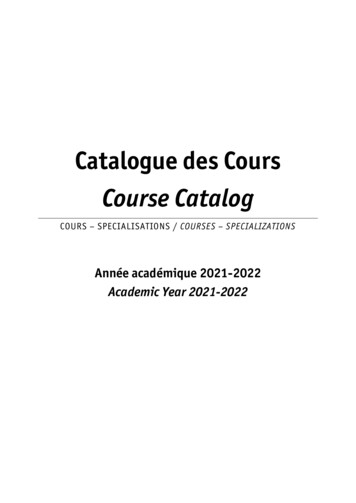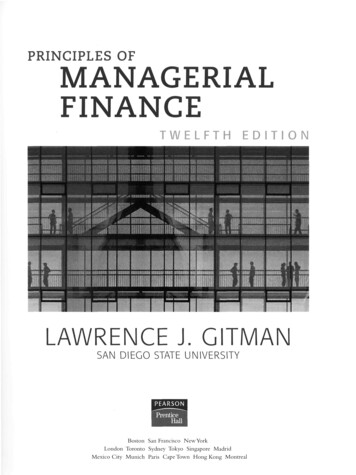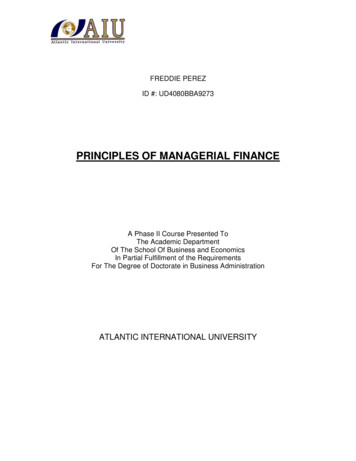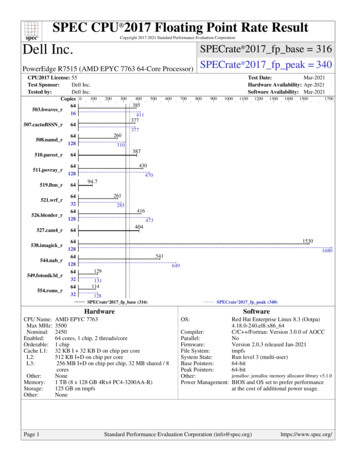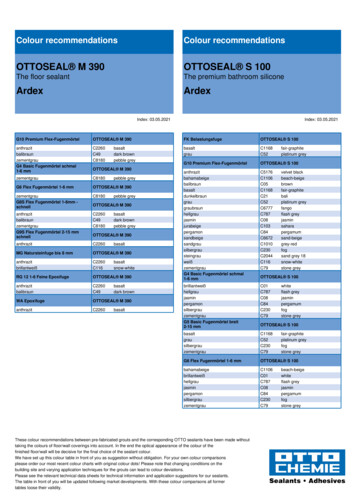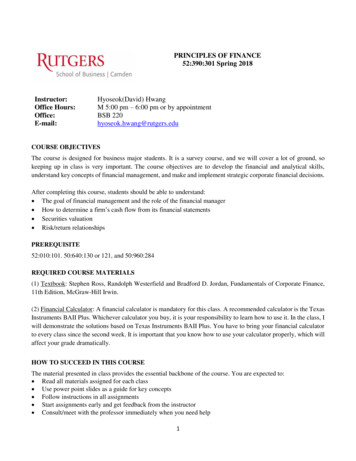
Transcription
PRINCIPLES OF FINANCE52:390:301 Spring 2018Instructor:Office Hours:Office:E-mail:Hyoseok(David) HwangM 5:00 pm – 6:00 pm or by appointmentBSB 220hyoseok.hwang@rutgers.eduCOURSE OBJECTIVESThe course is designed for business major students. It is a survey course, and we will cover a lot of ground, sokeeping up in class is very important. The course objectives are to develop the financial and analytical skills,understand key concepts of financial management, and make and implement strategic corporate financial decisions.After completing this course, students should be able to understand: The goal of financial management and the role of the financial manager How to determine a firm’s cash flow from its financial statements Securities valuation Risk/return relationshipsPREREQUISITE52:010:101. 50:640:130 or 121, and 50:960:284REQUIRED COURSE MATERIALS(1) Textbook: Stephen Ross, Randolph Westerfield and Bradford D. Jordan, Fundamentals of Corporate Finance,11th Edition, McGraw-Hill Irwin.(2) Financial Calculator: A financial calculator is mandatory for this class. A recommended calculator is the TexasInstruments BAII Plus. Whichever calculator you buy, it is your responsibility to learn how to use it. In the class, Iwill demonstrate the solutions based on Texas Instruments BAII Plus. You have to bring your financial calculatorto every class since the second week. It is important that you know how to use your calculator properly, which willaffect your grade dramatically.HOW TO SUCCEED IN THIS COURSEThe material presented in class provides the essential backbone of the course. You are expected to: Read all materials assigned for each class Use power point slides as a guide for key concepts Follow instructions in all assignments Start assignments early and get feedback from the instructor Consult/meet with the professor immediately when you need help1
COMMUNICATIONSakaiPosted will be the syllabus, resources (articles and examples), Power point slides, announcements, guides, etc. Toaccess this system, go to http://sakai.Rutgers.edu, log in, and click on the course tab on the top bar.Rutgers email (hyoseok.hwang@rutgers.edu)All communications to students will be done using the Rutgers email address provided to you. Please forward yourRutgers email to your personal email if necessary. Not checking your Rutgers email is not an excuse for missingany communications.ACADEMIC INTEGRITYPolicy found at grity-at-rutgers.Students are responsible for understanding the principles of academic integrity and abiding by them in all aspectsof their work at the University. Students are also encouraged to help educate fellow students about academicintegrity and to bring all alleged violations of academic integrity they encounter to the attention of the appropriateauthorities.Academic Integrity means that you (the student) must: Properly acknowledge and cite all use of the ideas, results, or words of others, Properly acknowledge all contributors to a given piece of work, Make sure that all work submitted as your own in a course activity is your own and not from someone else Obtain all data or results by ethical means and report them accurately Treat all other students fairly with no encouragement of academic dishonestyAdherence to these principles is necessary in order to ensure that: Everyone is given proper credit for his or her ideas, words, results, and other scholarly accomplishments All student work is fairly evaluated and no student has an inappropriate advantage over others The academic and ethical development of all students is fostered The reputation of the University for integrity is maintained and enhanced.Failure to uphold these principles of academic integrity threatens both the reputation of the University and the valueof the degrees awarded to its students. Every member of the University community therefore bears a responsibilityfor ensuring that the highest standards of academic integrity are upheld. Violations are taken seriously and will behandled according to University policy.If there are questions on how to comply, please contact Mary Flaherty in the Rutgers-Camden Dean ofStudents office: marykreb@camden.rutgers.edu or contact the appropriate Associate Dean or Area Headat the School of Business.STUDENT CODE OF CONDUCTViolations of the Student Code of Conduct are considered serious infractions of student behavior and students whoviolate the code are subject to penalties relative to the level of the matter. In general, students may not disturbnormal classroom procedures by distracting or disruptive behavior. Examples of disruptive behavior include, butare not limited to, the following:2
Repeatedly leaving and entering the classroom without authorizationAnswering cellular phone or allowing pager to beepMaking loud or distracting noisesRepeatedly speaking without being recognized, interrupting the instructor or other students, or otherwise actingin disregard of the instructor’s requestsThreats or violenceViolations of the code should be reported to the Dean of Students office deanofstudents@camden.rutgers.edu or856-225-6050.If the violation is immediate and a potential threat is a concern, call the Rutgers-Camden police at 856-225-6111DISABILITY SERVICESRutgers University welcomes students with disabilities into all of the University's educational programs. In orderto receive consideration for reasonable accommodations, a student with a disability must contact the appropriatedisability services office at the campus where you are officially enrolled, participate in an intake interview, andprovide umentation-guidelines.If the documentation supports your request for reasonable accommodations, your campus’s disability servicesoffice will provide you with a Letter of Accommodations. Please share this letter with your instructors and discussthe accommodations with them as early in your courses as possible. To begin this process, please complete theRegistration form on the Office of Disability Services web site orm.Ajeenah Nuriddin-Little(856) 225-2722Rutgers-Camden Disability Services:Rutgers-Camden Learning CenterArmitage Hall, Room 240311 North Fifth Street, Camden, NJ 08102-1405Web page: esE-mail: T DATESTuesday, January 16 – First day of Spring 2018Tuesday, January 23– Last day to drop a class without a “W” (this can be done through WebReg)Monday, April 2 – Last day to withdraw from one or all classes with a “W” (This can be done throughWebReg). For more information, see the registrar’s website http://registrar.camden.rutgers.edu/Saturday, March 10 – Sunday, March 18 – Spring recessMonday, April 30 – Last day of classesThursday, May 3 – Wednesday, May 9 – Final Exam Period3
GRADINGYour final grade is based on your performance on the exams, quizzes, reports, homework assignments, andattendance.Grade breakdown:Exams (3)Homework Assignments (5)Report (3)Quizzes (5)Attendance and ParticipationTotal300 (100 100 100)100602515500GRADING SCHEMEAB BC CDF 90% 85% 80% 75% 70% 60% 90% of total scores 85% of total scores 80% of total scores 75% of total scores 70% of total scores 60% of total scoresof total scoresAll grading is done on a percentage basis. If your grade falls below the cutoff, you will get the next grade - noexceptions.EXAMThe exams will cover required readings, lecture materials, and in-class discussions. There will be three noncumulative exams. Any missed exam will receive a grade of zero. There will be no make-up exams given for anyreason. If you have a legitimate excuse for missing an exam, contact me before the exam in order to be excused.Absence in any exam without prior approval will result in a zero grade.HOMEWORKThe homework assignments will cover a number of selected questions from discussed materials. The assignmentsare designed to enhance students’ understanding and comprehension about the issues discussed in class. Any missedhomework assignment will receive a grade of zero and there will be no make-up assignments. No late assignmentsare accepted; neither are faxed nor e-mailed assignments. The homework assignments and due dates will beannounced in class.QUIZThe quizzes will cover all the materials discussed in class. During the lecture, the questions on each quiz will beemphasized. The highest 5 quizzes will be counted toward the final grade. Any missed quiz will receive a grade ofzero and there will be no make-up quiz.4
REPORTStudents are required to write three reports about selected topics. The topics are from course materials as well asrelated real world examples. The report is designed to help students link course concepts to real word. The topicsand due dates will be announced in class. No report will be accepted after the due date.ATTENDANCE AND PARTICIPATIONClass presence and participation points are given to encourage your active class participation and discussion. Youwill be rewarded with a perfect score as long as you frequently come to class and actively contribute to the classdiscussion during lectures.Presence: Although it is not required, most students send their professor a brief e-mail to explain their absence inadvance. Students who repeatedly arrive late to the lecture will have their Class Participation grade lowered. Pleasesign the attendance sheet when you come to the class. Any false signatures will result in zero participation gradesfor all parties involved.Participation: I expect you to participate in class through discussions and Q&As. In addition, I expect you to refrainfrom using laptops, cell phones, earphones, and other electronic devices during class.EXTRA CREDITS (10 PTS.): TEACHING EVALUATIONSubmit a screenshot of the completed survey on teaching evaluation through Sakai.SUGGESTIONS AND COMPLAINSPlease feel free to see me for any special problems or complaints which may be impeding your progress in thecourse. Feedback is always appreciated and will be considered to improve the learning environment in this andsubsequent semesters.5
COURSE OUTLINE (subject to change)WeekDateChapters and TopicsChapters222-JanIntroduction to Corporate Finance1329-JanFinancial Statements, Taxes, and Cash Flow245-FebWorking with Financial Statements3512-FebIntroduction to Valuation: The Time Value of Money5619-FebIntroduction to Valuation: The Time Value of Money5726-FebDiscounted Cash Flow Valuation685-MarDiscounted Cash Flow Valuation6912-MarSpring Break1019-MarInterest Rates and Bond Valuation71126-MarInterest Rates and Bond Valuation7Stock dterm 1Midterm 2Stock Valuation8Stock Valuation8Net Present Value and Other Investment Criteria9Net Present Value and Other Investment Criteria9Some Lessons from Capital Market History12Some Lessons from Capital Market History12Return, Risk, and the Security Market Line13Return, Risk, and the Security Market Line136
Introduction to Valuation: The Time Value of Money 5 Midterm 1 7 26-Feb Discounted Cash Flow Valuation 6 8 5-Mar Discounted Cash Flow Valuation 6 9 12-Mar Spring Break 10 19-Mar Interest Rates and Bond Valuation 7 11 26-Mar Interest Rates and Bond Valuation 7 Stock Valuation 8 12 2-Apr Midterm 2 Stock Valuation 8

